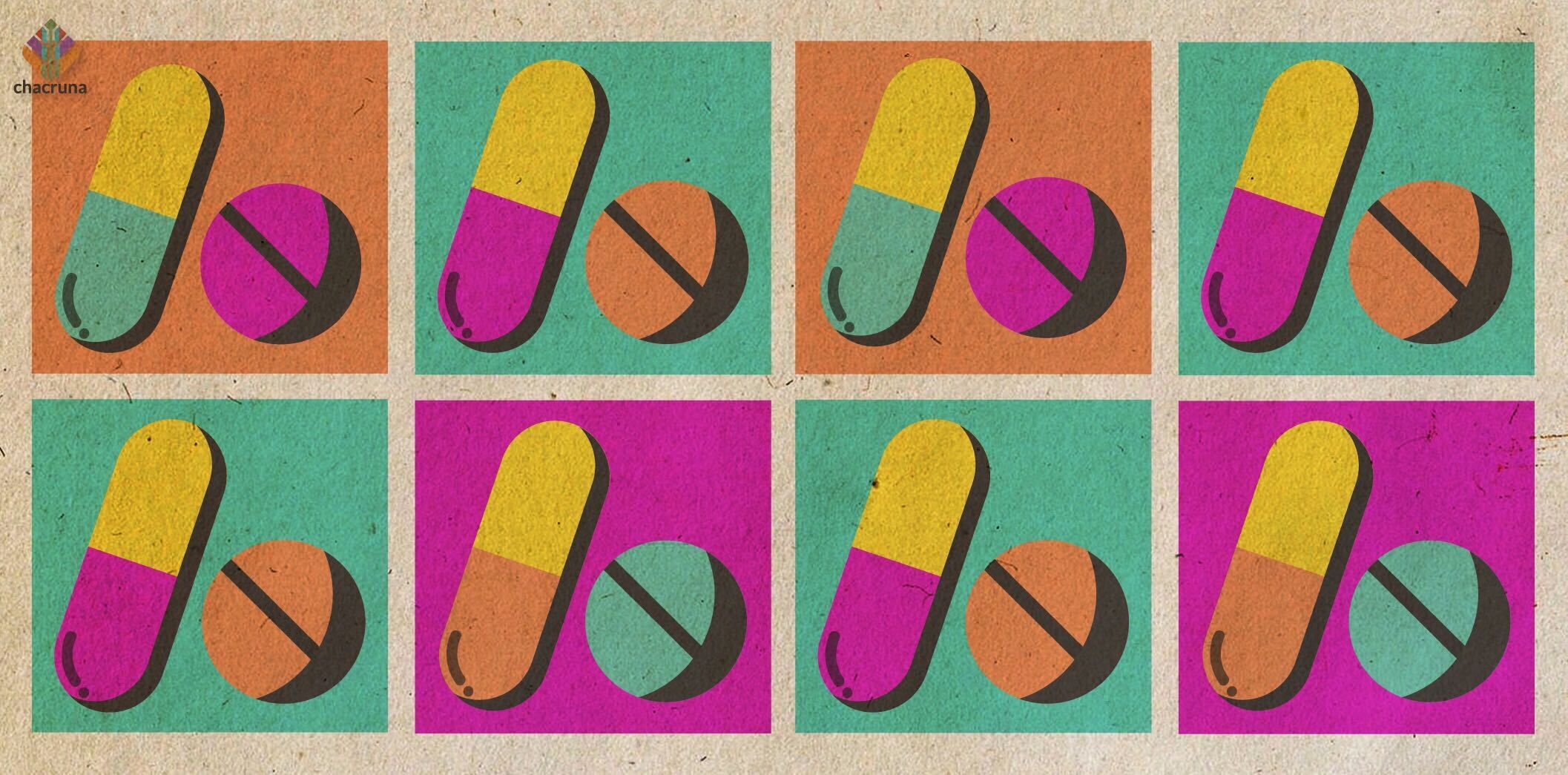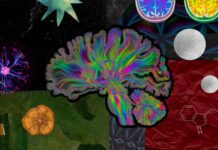- How I Joined the Secret SSRI Circles of 1985 - September 14, 2021
- A Nurse’s Call for Keeping the Human in Psychedelic-Assisted Therapy - October 29, 2020
Psychedelics Devoid of Therapy: Convenient Access or Dark Dystopia?
Sometime during the fall of 2024, during the fourth year of the pandemic and sometime after Donald Trump declared himself “America’s CEO” for life, the trauma of losing your parents to COVID and your youngest child to an opiate overdose really began to catch up with you. Sleeping only brings a steady stream of horrible recollections: saying goodbye to your parents over zoom before they were intubated for the last time, of finding your son face down with a needle in his arm. The morning is no better, your heart alternates between numbness and feeling as if there is an electrical short in it, causing you to startle and sweat. The numbness is the worst, as nothing brings joy anymore. The numbness doesn’t even allow for tears. They too, like all emotions, feel like they’re somewhere on the other side of innumerable layers of insulation. Everything—eating, washing, getting on the computer to go to work—is simply done to maintain an inkling of a future, as impossible as that future is to imagine. In your darkest moments, sure, you considered suicide. You knew you couldn’t bring yourself to abandon your remaining children, but how much longer could you live in this bardo, the space between who you once were and the battered shell you’ve become?
While the days are certainly dark, there have been glimpses of hope. Last year, facing a mounting suicide rate, the FDA agreed to stop the remaining studies of MDMA-assisted psychotherapy for PTSD and approve the treatment, but they also eliminated any exclusivity agreements they’d made with MAPS, the sponsor of those studies for 25 years. They were forced by President Trump’s promise of, “we’re going to get MDMA to anyone who needs MDMA,” and the market rushed in to meet the opportunity. This meant easier access, but part of increasing that access was a significant reduction of the “psychotherapy” in “psychedelic-assisted psychotherapy.” It was a good thing, too. Now, anyone with a smart phone and a “secure location” could order a course of MDMA therapy for just $199. While you technically needed a doctor’s prescription and a PTSD diagnosis, that formality was easily satisfied with a series of questionnaires answered on your phone and a 5-minute confirmation visit over video with a doctor on the other side of the screen. There were dozens of companies advertising to you on your Facebook feed, but after clicking around, you chose the “Freedomly©” app, as the tagline, “If your mind is free, your body can be anywhere,” resonated with you.
Following the consultation with the online doctor and making the secure payment, you were given a link to download the “pro” version of the Freedomly app. After downloading it and linking it to your home security camera system and gun safes (ever since the second Trump administration threatened, “You want to see what it’s like not to have a police department? We will show you,” and shifted the responsibility of the police towards “protecting the country against the traitorous left,” petty crime had skyrocketed. Everyone installed home security systems and purchased guns). In order to have the MDMA sent by courier to your house, the app made you agree to give access to your in-home security cameras and to the electronic lock of your gun safe “for safety and monitoring purposes during the session.” There was some confusing clause in the terms and conditions about “intermittent home monitoring in perpetuity for purposes of safety monitoring, outcome measurement, training, and quality control,” but, honestly, you didn’t read it closely. After so many failed treatments for your PTSD, you only wanted to feel better.
You took a sick day from the home office on the day that the MDMA was to arrive and, as the app suggested, you set up a “nest” in the living room, in view of two of your security cameras. Your laptop was close by, and you opened up the Freedomly page on your screen, enabled the webcam and, after a chatbot check in, a “Freedomgyde” named Kat briefly appeared on the screen introducing herself, and explained you only needed to hit the space bar if you needed help and someone would appear on screen shortly (“…unless there’s high call volume, in which case, it may be longer”).
You watched the UPS tracking app closely, not only because you were excited about the possibility of your PTSD possibly improving a little, but also because the terms of the Freedomly contract only activated the electronic unlock code for the package for an hour after delivery. This was part of the rules that the FDA made upon approval of MDMA, but ever since the third large wave of COVID deaths disproportionately killed many delivery drivers, packages were delivered like an old-fashioned newspaper boy, tossed onto the front porch. You couldn’t afford to have this delivery stolen from your doorstep.
After a couple of failed attempts, the metal opening on the package slid open, revealing two shimmering mauve and purple, capsules, labeled “Primafree (#1 – launch)” and “Deeperfree (#2 – booster).”
Your phone pinged, announcing that the medication had been delivered. Grabbing a mask, you run outside for the first time in days after sheltering indoors because of the wildfire smoke that now marks the start of every fall, snatch the small box, a cleverly designed, proprietary packaging by Pandoorperception(c) with an integrated iris reader, and dash back inside. When you pushed the button on the Freedomly webpage, saying, “I’m ready to proceed,” the chatbot came back on, asking you to enter the number on the package and to allow for an iris scan. After a couple of failed attempts, the metal opening on the package slid open, revealing two shimmering mauve and purple, capsules, labeled “Primafree (#1 – launch)” and “Deeperfree (#2 – booster).”
Your online preparatory video sessions suggested placing the capsules in a vase or cup that held good memories for you. You chose two beautifully decorated teacups delicately painted with geometric designs from your 2016 visit to Turkey, and put them on the “Centering Space” that the Freedomly app had suggested you create in your home in front of the laptop. The agreement specifically forbade candles or incense on the centering space (too dangerous to have burning when home alone), but suggested electronic LED candles or the Flyckr app (which simply looped a picture of a candle on your phone and had become popular during the virtual funerals of the second wave of the pandemic) be placed on the Centering Space.
The chatbot offered several programs of music and video with geographic themes, “tropical island,” “desert breeze,” “calm sea journey.” Choosing the latter, the screen on your laptop became a calm ocean scene, and soothing music began to pour from the speakers. A small window at the top right of your screen had a cheerful message, “You are love. If you need help during your journey, press the space bar, and a Freedomly Guide will be with you as soon as possible. But know that we are watching you. We are here. We love you.”
The preparation sessions had suggested that you set an intention before you ingested the medicine. You struggled with holding the intention for inner peace while at the same time being flooded with the images of your parents on that same computer screen, breathlessly saying “I love you” before the doctor came on the facetime call and said, “ok, we’re going to help them breathe now, you can monitor their progress over the app and contact our call center if you have questions.” The thought of not being with them in their final hours brought along its usual anguish. You’d become used to this anguish since 2020; it became a regular visitor. But, as the Freedomly app preparations taught you, in this cup before you, is hope, is Freedom. Watching all the testimonial videos on the Freedomly website from people who had far worse trauma than you, people that got caught up in the domestic terrorism following the election of 2020; the meme makers and journalists who spent a year or two in the patriot’s camps being “salvaged” following the election, surely their trauma was worse than yours, and if theirs could be cured with MDMA, couldn’t yours?
You clicked the green button on the screen, marked “swallowing” just before taking the capsule into your mouth and washing it down with a glass of water. The chatbot reminded you, “we’re watching you, with love.” As the soft notes of an Icelandic pianist played out of the computer speakers, you lay back in your nest, and hoped for the arrival of peace.
* this is a fictional account of a composite patient. All names of persons, companies, and proprietary brands are fiction.
~~~~~~~~~~~~~~~~~`
Why We Must Protect the Human Element in Health Care
Could this depersonalized, dystopian tale be the future of psychedelic therapy? Stripped down to a do-it-yourself biological model, the costly human aspects of in-person psychotherapy and person-to-person care replaced by technology? Is this what psychedelics without human interaction looks like? I want my prediction to be wrong.
As a nurse, I’m interested in the experience of care in “health care.” I’m interested in how the human-to-human interactions that comprise the experience of being cared for when we are sick, influence not only the experience of the illness, but also the outcome of the treatment. Care, however, is time-consuming. Care is costly. As such, there will be marketplace pressure to reduce the amount of care when psychedelic therapies are FDA approved. Nurses are familiar with this desire from health-care systems when nursing staffing is reduced to lower costs. The fewer personnel required, the less the treatment will cost.
This is why, along with key nursing and psychedelics colleagues, I have begun to articulate the experience of care delivered in psychedelic therapy. Marrying Janis Phelps’ articulation of the competencies of a psychedelic therapist with seminal theoretical work by nursing theorist Jean Watson, we have created a model described in a forthcoming paper, Psychedelic Assisted Psychotherapy Practices and Human Caring Science: Toward a Care-informed Model of Treatment (under review).
In this paper, we describe how the psychedelic psychotherapist (we focus on ethics that are central to nursing but could be integrated by members of any caring profession. As such, I use the terms “nurse” and “therapist” interchangeably here) must tend not only to the patient, but also to themselves and the world around them. Many of these sensibilities are intuitive and obvious to psychedelic therapists, but bear naming, for, if left unnamed, they will not be valued or appreciated and, as such, could be eliminated in the interest of containing costs.
The therapist does not insert their own agenda into the experience of the patient, but rather allows for a gentle witnessing of whatever arises.
The nurse tends to the inner world of a patient when they approach them with the equanimity and loving-kindness that allows for the expression of all feelings, negative or positive, that arise during the session. The therapist does not insert their own agenda into the experience of the patient, but rather allows for a gentle witnessing of whatever arises. It is through this attention that a trusting, collaborative relationship between the therapist and the patient is created; a relationship in which the authentic presence of the therapist supports the inner experience of the patient. Within this relationship, the nurse can then begin to both learn from the patient while, at the same time, the therapist teaches the patient. The nurse brings these skills and experience together to creatively engage the patient in ways that help them to heal. By meeting patients in this way, avoiding a top-down, interventionist approach, the patient and nurse become partners in healing, rather than the patient being the “consumer” of care, and the therapist being the “provider” of care.
We posit that the therapist must not only tend to the patient, but also to themselves and the world around them. This takes the form of the nurse cultivating and nurturing their own personal meaning-making activities and spiritual practices so that the nurse is well-prepared to assist in helping the patient navigate their own suffering that may emerge during the psychedelic session.
Appropriate, nurturing touch has always been a sacrament of nursing, and nurses have long been entrusted to utilize touch with patients in the service of healing.
Nursing, since the time of Florence Nightingale, has acknowledged that the physical environment of the patient impacts both health and the recovery from illness. This dovetails well with the psychedelic notion of “setting,” a supportive physical place for the therapeutic work to unfold. Finally, the nurse/therapist must safely tend to the physical needs of the body while the patient is undergoing psychedelic therapy, be that by providing liquids, adjusting the temperature of the room, or assisting in trips to the toilet. Appropriate, nurturing touch has always been a sacrament of nursing, and nurses have long been entrusted to utilize touch with patients in the service of healing. This question of touch has been, at times, a thorny issue among psychotherapists training in psychedelic modalities, as “healing touch” has been conflated with “sexual touch” in psychotherapy, a clear line that should clearly never be crossed. This prohibition of sexual contact with patients has been underscored by study sponsors and psychedelic nursing organizations.
Psychedelic therapy should always be the experience of one person (or persons) helping to heal another person with the assistance of the medicine.
Psychedelic therapy should always be the experience of one person (or persons) helping to heal another person with the assistance of the medicine. It should not be reduced to provision of a drug alone. Our paper is an urgent call to value, articulate, and study the human-to-human element of psychedelic therapy. It may be obvious to those of us who practice this therapy, but when those who pay for the therapy wish to reduce the cost of the treatment by replacing human relationships with technology, we must generate evidence to bolster our claims that the therapeutic relationship is critical. Otherwise, the dystopian future predicted in my opening anecdote above may be closer to reality than we imagine.
I’d like to acknowledge my co-authors of this forthcoming paper: Janis Phelps, Ph.D., Professor at the California Institute of Integral Studies and Director of the Center for Psychedelic Studies and Therapy; William E. Rosa, PhD, MBE, ACHPN, FAANP, FAAN, Postdoctoral Research Fellow in Psycho-Oncology, Department of Psychiatry and Behavioral Sciences, Memorial Sloan Kettering Cancer Center; and Jean Watson, PhD, RN, AHN-BC, FAAN, (LL-AAN), Distinguished Professor Emerita and Dean Emerita, University of Colorado, Denver, College of Nursing, and Founder and Director of the Watson Caring Science Institute.
Art by Marialba Quesada.
Reference
Penn, A. D., Phelps, J., Rosa, W. E., & Watson, J. (under review). Psychedelic-assisted psychotherapy practices and human caring science: Toward a care-informed model of treatment.
Take a minute to browse our stock:
Did you enjoy reading this article?
Please support Chacruna's work by donating to us. We are an independent organization and we offer free education and advocacy for psychedelic plant medicines. We are a team of dedicated volunteers!
Can you help Chacruna advance cultural understanding around these substances?














